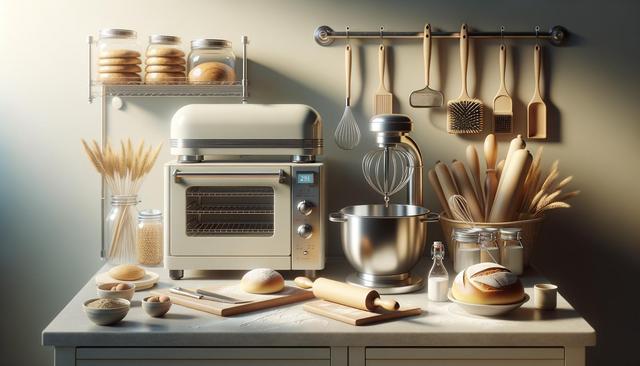Understanding the Importance of Bakery Equipment
For any bakery, whether it’s a small local shop or a growing commercial facility, having the right equipment is crucial for smooth and efficient operations. The right tools not only help maintain consistent quality but also reduce labor time, minimize waste, and support food safety protocols. Investing in reliable bakery equipment allows bakers to scale operations and meet customer demand without compromising on product standards.
Bakery equipment is central to every stage of production—from mixing and proofing to baking and decorating. Without proper tools, even highly skilled bakers may struggle to maintain consistency or meet deadlines. Moreover, streamlined operations depend on equipment that fits the specific volume and type of baked goods being produced. For example, a bakery that specializes in artisan bread will require different machinery than a patisserie focused on delicate pastries.
Key categories of essential bakery equipment include mixers, ovens, proofing cabinets, refrigeration units, and work surfaces. Choosing equipment that aligns with your product range and output volume is a strategic decision that lays the foundation for long-term success.
Mixers: The Heart of Dough Preparation
One of the most critical components in a bakery is the mixer. Dough mixers come in various types, including planetary, spiral, and horizontal models, each suited to different mixing needs. Spiral mixers, for example, are excellent for bread dough because they handle large volumes while maintaining dough integrity. Planetary mixers are more versatile and can be used for batters, creams, and even kneading small batches of dough.
When selecting a mixer, consider the following:
- Batch size and frequency of use
- Type of dough or batter being prepared
- Ease of cleaning and maintenance
- Adjustable speed settings for different mixing requirements
High-quality mixers increase productivity and reduce wear on ingredients, helping maintain the desired texture and consistency in every batch. Additionally, automated features such as programmable timers and ingredient feeders can further streamline operations by minimizing manual intervention.
Ovens: Precision in the Baking Process
The oven is the centerpiece of any bakery. It determines not just how well your products are baked, but also how efficiently you can meet customer demand. There are several types of ovens used in bakeries, including deck ovens, convection ovens, and rack ovens. Each has its own advantages based on the type of product and production scale.
Key factors to consider when choosing an oven include:
- Temperature consistency and distribution
- Energy efficiency
- Capacity and space requirements
- Programmability for different products
Deck ovens are ideal for artisan bread with crispy crusts, while convection ovens are better for cakes and pastries due to their even heat circulation. Rack ovens are often used in high-volume settings, allowing for large batches to be baked simultaneously.
Investing in a reliable oven ensures baked goods come out with the desired finish, texture, and flavor, helping maintain customer satisfaction and product quality.
Proofers, Retarders, and Refrigeration
Proofing is a critical step in bread production, allowing dough to ferment and rise to the correct volume and texture. A proofer cabinet maintains the ideal environment for yeast activity by controlling humidity and temperature levels. Some bakeries also use retarder proofers, which slow down the fermentation process, allowing for overnight proofing and better scheduling of production.
In addition to proofers, refrigeration units are essential for storing ingredients and finished products. These include:
- Reach-in refrigerators and freezers
- Walk-in coolers for bulk storage
- Display cases for front-of-house presentation
Proper refrigeration is vital for food safety, extending shelf life, and maintaining ingredient quality. Equipment with adjustable temperature controls and energy-efficient features can contribute significantly to operational savings over time.
Combining proofers and refrigeration units strategically helps bakeries manage production flow, reduce waste, and ensure consistent product availability throughout the day.
Work Surfaces, Smallwares, and Safety Tools
While large equipment often takes center stage, smaller tools and work surfaces play an equally important role in bakery efficiency. Stainless steel work tables provide a hygienic, durable surface for rolling dough, decorating cakes, or assembling pastries. Shelving and storage units help maintain organized workflow and prevent cross-contamination.
Essential smallwares include:
- Mixing bowls and measuring tools
- Rolling pins, cutters, and molds
- Pastry bags and tips for decorating
- Scrapers and bench knives for portioning dough
In addition to production tools, safety equipment such as gloves, aprons, and first-aid kits are necessary to maintain a safe working environment. Proper lighting and ventilation also contribute to a comfortable and compliant workplace.
Attention to these details enhances workflow, reduces downtime, and supports both quality and safety standards within the bakery.
Conclusion: Building an Efficient Bakery Foundation
Equipping a bakery with essential tools is more than just a one-time investment—it’s an ongoing strategy to support product quality, staff efficiency, and customer satisfaction. From mixers and ovens to refrigeration and smallwares, each piece of equipment plays a role in the broader system of streamlined operations. By selecting tools that align with your production needs and maintaining them properly, bakeries can foster long-term growth and sustainability in a competitive market.






